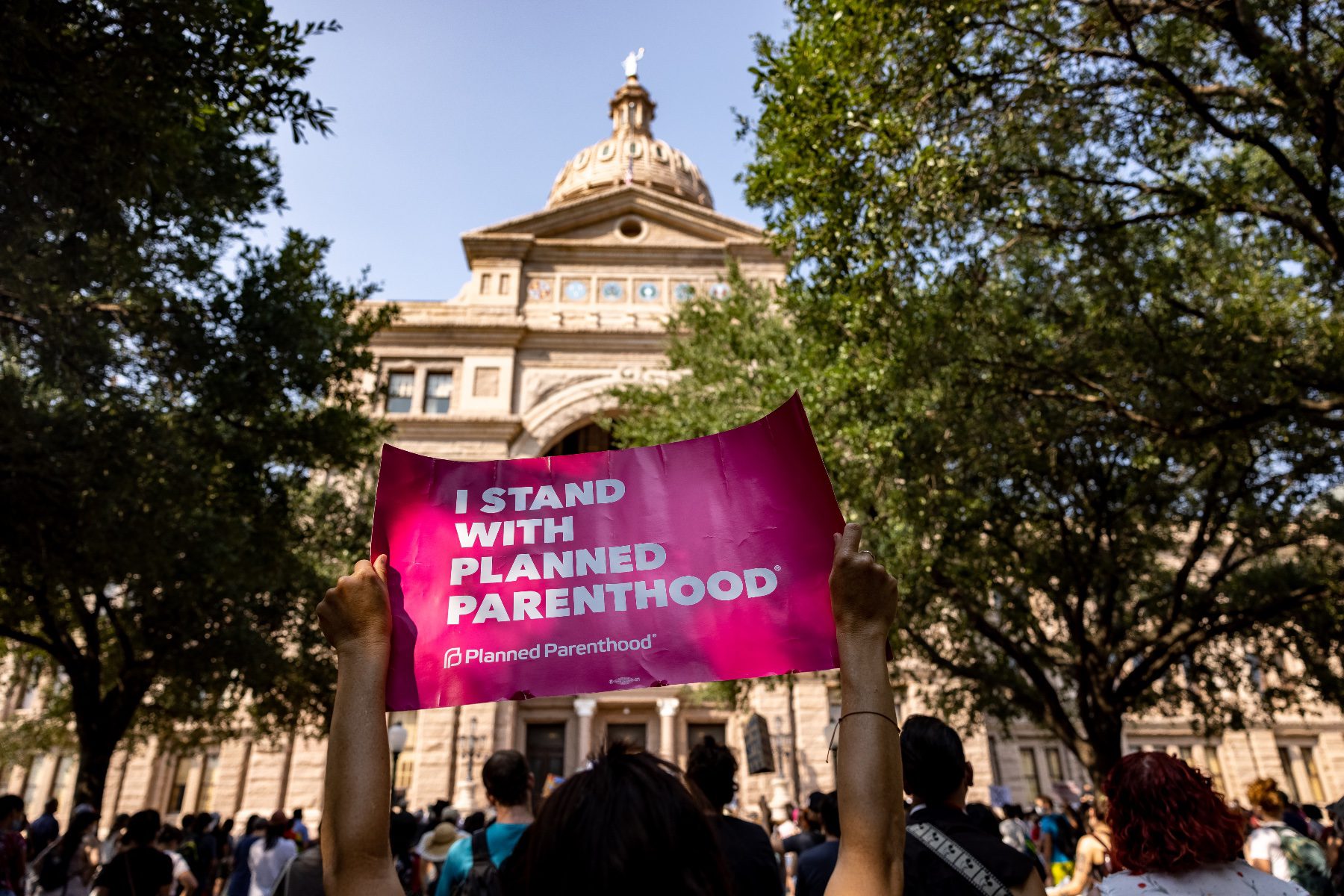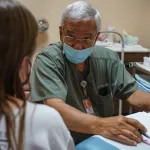Three days after the U.S. Court of Appeals for the 5th Circuit allowed Texas’ six-week abortion ban to resume and roughly 24 hours before the deadline the court set for the Department of Justice to respond, six regional Planned Parenthood groups in Texas and surrounding states have filed a brief detailing the impact the ban has had on patients and providers.
The amicus brief — a legal brief submitted to a court hearing a case by someone who is not a named party in a suit, but who wants to express their support for one side — was shared with The 19th in advance of its filing. The 5th Circuit on Friday gave the Department of Justice, which brought the suit against the state of Texas, until 5 p.m. CT on Tuesday to respond to the preliminary injunction, presenting a summary of their argument about why Senate Bill 8 should be blocked.
The Planned Parenthood filing to the 5th Circuit includes details not only how patients’ lives have been impacted in Texas, but how those in surrounding states have had to adjust practices to accommodate new patients because of SB 8. All of those who shared stories in the brief, both patients and providers, are anonymous due to the sensitive nature of the topic and the potential for legal liability under SB 8.
One woman who shared her story for the brief is a single mother of a kindergartner, balancing work and school after leaving an abusive relationship with her daughter’s father. When she was pregnant with her daughter, the abuse escalated, only continuing after her child’s birth.
Finding out she was pregnant just as she was starting to rebuild her life away from her abuser has been devastating. “There was just no way that I could physically, mentally, emotionally go through that again,” the patient said in an interview for the brief.
But that might be her only choice, as she is not able to currently get an abortion in Texas under SB 8 and is unsure if she will be able to take time off from work and arrange for child care.
Another patient interviewed for the brief has been tracking her periods on her phone through an app. But still, as a result of irregular periods, she discovered she was pregnant and was much further along than she had originally thought. She was outside of the window in Texas, which effectively bans pregnancies after six weeks. She is throwing up daily and struggling to make it through the workday but worried that going out of state might not be an option. She works retail and is not allowed to take time off in the next three months. Choosing to go out of state for abortion would mean losing her job, and she lives paycheck-to-paycheck as it is.
Providers and staff at various Planned Parenthood clinics in Texas have more stories to share in the brief about the patients they have seen since SB 8 went into effect on September 1: There is a patient in Houston who had detectable embryonic cardiac activity on the day of her procedure, despite not showing such activity when she was in the clinic for the ultrasound before her mandatory 24-hour waiting period the day before. In Dallas, one patient was willing to travel out-of-state for abortion care but unable to because of the terms of her probation. In San Antonio, an undocumented patient expressed safety concerns tied to traveling out-of-state, recognizing that she would need to carry an unwanted pregnancy to term rather than jeopardize her immigration status.
Even for those who do manage to access care out-of-state, doing so isn’t easy. Another patient whose story is included in the brief is already a mother to seven children. She lost her job after her kids contracted COVID-19, and she needed to stay home and care for them. The closest out-of-state appointment for her would be in Mississippi, but the first available appointments were nine weeks out. So she opted for an appointment in Oklahoma, which she could access sooner. She woke up at 4 am to begin the six-hour drive to the clinic there, spending over half of her monthly wages on hotel, food and gas needed for the trip.
Another patient who was interviewed for the brief was delayed in accessing care after first visiting a crisis pregnancy center that told her that she would need to get an ultrasound to date her pregnancy but that she would need to wait a week to be able to do so there. Crisis pregnancy centers are frequently religiously-affiliated organizations and market themselves as “options counseling” and reproductive health clinics, despite often not being able to offer medical care by trained providers. By the time of her second appointment for her requested ultrasound, she was six weeks pregnant and no longer able to legally access abortion in Texas.
Providers and staff at clinics both within and outside of Texas are struggling as a result of SB 8, too.
One staffer in an Oklahoma clinic said in the brief that Texas patients constitute the majority of the patients they serve now and that staff are working untenable hours to be able to keep up with the number of patients coming from Texas needing care. The demand for abortion care from Texas patients in Oklahoma is so great, this staffer shared, that the clinic at which she works can no longer provide family planning and contraceptive care — there simply isn’t time in the schedule for that between the timely and in-demand need for abortion care from those coming from Texas.
Furthermore, this staffer also shared that clinicians can no longer offer pain medication or sedation to patients, because so many are turning around immediately from their procedure to begin their lengthy drives back home, and doing so after receiving such medications would be dangerous. And they are running out of the supplies they can disseminate — like menstrual and heating pads — because so many more are now needed to help stock patients up before they begin their drives back to Texas.
Two staffers at Planned Parenthood health centers in Texas who were interviewed for the amicus brief spoke to The 19th on the condition of anonymity about their concerns for their patients’ safety and their families lives as a result of SB 8 and what they are seeing at the clinic where they work.
One staffer who asked to be identified as C.Y. described SB 8 as a “complete struggle.”
“These patients are not able to be seen, so many are unaware of what’s going on in the news. They’re expecting help. That’s what we do. We help patients. But the majority of patients scheduled aren’t being helped. We can go as far as giving them the resources [for information] to go out-of-state.” But most, she says, cannot do that because they have “multiple children, sick children” and “can’t just up and go out of state.”
C.Y. added that many patients have come into the clinics for ultrasound appointments already knowing they are past the six week deadline imposed by SB 8, but “they want information just so they can go online and buy stuff from these unknown sources. They’re taking pills, they’re buying all kinds of pills and doubling up on pills, which is unsafe.”
“This is when I get really nervous,” said a second staffer, who asked to be identified as I.O. “I get anxiety. I get to shaking when somebody told me they were going to do that. You don’t know what that’s going to result in. You don’t know if it’s going to result in death or some kind of serious matter where they just can’t get the care.”
While self-managed abortion utilizing the FDA protocol for medication has been documented to be safe and efficient, C.Y. and I.O. stressed that their concerns are about people who are trying to terminate pregnancies without being able to access the correct medications or providers who can advise them. Their fear is that when people need to end a pregnancy by any means possible and do it quickly, their options might not always be the safest ones.
When patients express these things to her, “I keep it real,” C.Y. said. “I have to let them know, ‘Hey, this is something I do not promote and this is something you should not do.’” She said many patients have called their call center asking for the names and types of medications that are utilized in abortion care in their clinics, and how many milligrams are dispensed at what gestational age. This information is never disclosed to patients who call asking for it, “but we have a lot of people that are asking questions before they even see us because they want to do things on the side.”
I.O. said she hopes that the 5th Circuit will understand that as a result of SB 8, people “don’t know what to do. They’re working dead-end jobs. They have other children. They’re like, ‘What am I going to do when [a baby] gets here?’ They have to make life-changing decisions and now they have to do a lot that they probably don’t want to do.”
Which is why C.Y. said she hopes that Planned Parenthood’s amicus brief will resonate with the conservative 5th Circuit. Patients as young as 11 and as old as 46 seeking abortion care in their home state have been turned away, changing their lives forever, she said. “Now these patients are becoming parents, and they don’t want to be parents. They don’t have the money. And they are going through things. And I need [the 5th Circuit] to understand the severity and the damage that they have caused.”






